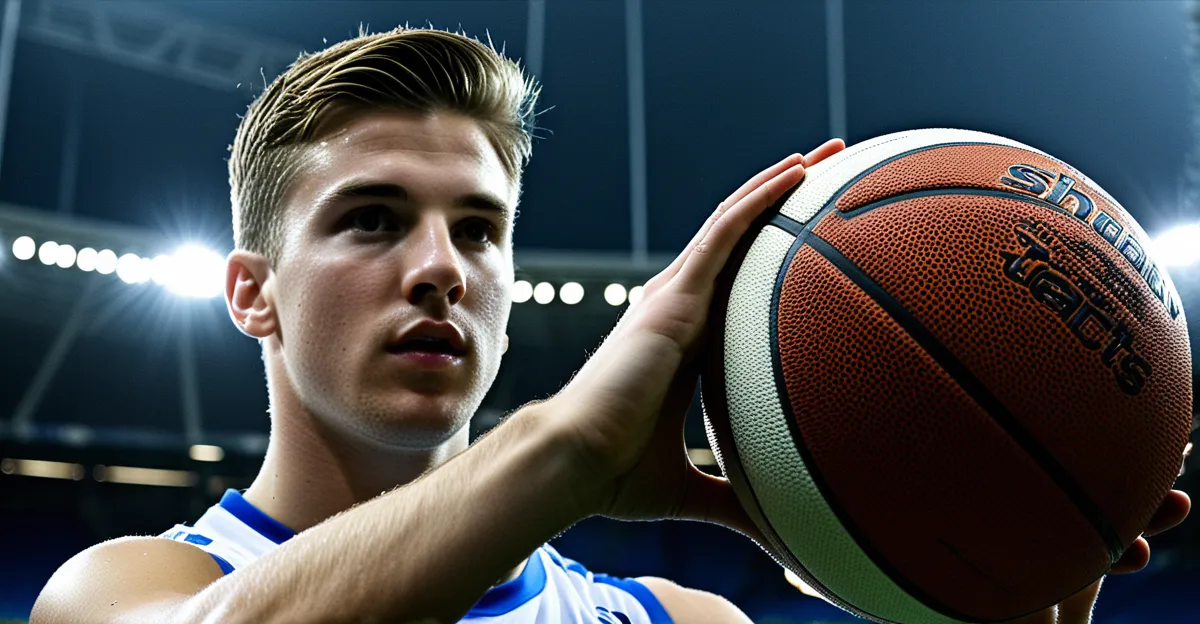Strategies for Nurturing Future Sports Talent in the UK
Developing UK sports talent relies heavily on well-structured pathways that support young athletes from an early stage. Sporting organisations focus on creating clear progression routes that guide athletes through local clubs, schools, and national programs. This approach ensures continuous skill-building and motivation.
Early engagement plays a crucial role in nurturing young athletes. By introducing children to sports at a young age, they develop fundamental skills and a passion that fuels long-term commitment. Schools work closely with clubs and national governing bodies to provide diverse opportunities, combining educational sports programs with practical training environments.
Also read : How can UK sports teams promote diversity and inclusion?
Collaboration among these stakeholders forms the backbone of effective strategies for future athletes. National bodies offer expertise and funding; schools facilitate access to facilities and competitions; clubs identify and refine talent through regular practice and mentorship. This integrated system not only discovers promising athletes but also supports their holistic development, preparing them for elite competition levels.
Strategies for Nurturing Future Sports Talent in the UK
Laying solid foundations in UK sports talent development begins with clear, structured pathways designed by sporting organisations. These pathways typically involve collaborations between clubs, schools, and national governing bodies, creating a seamless progression from grassroots to elite levels. Early engagement in sports plays a crucial role; catching young athletes’ interest and developing their skills during formative years enhances future performance.
This might interest you : What role does funding play in UK sports development?
Such collaborations ensure young athletes receive consistent training and support. Schools often provide initial platforms through educational sports programs and competitions, while clubs offer specialised coaching. National governing bodies contribute by standardising training frameworks and promoting talent identification initiatives.
Investing in nurturing young athletes also means focussing on tailored training regimes that address physical and mental development. Combined, these strategies for future athletes leverage multiple touchpoints to retain promising talent, fostering resilience and competitive edge. By intertwining school exposure, community involvement, and professional guidance, the UK sports system cultivates well-rounded athletes poised for success on national and international stages.
Investing in Grassroots and Community Sports
Local clubs and community groups serve as the entry point for many in the UK sports talent development system. They play a vital role in identifying young talent early and fostering enthusiasm for sports. Through grassroots sport investment, these organisations create accessible environments where nurturing young athletes can explore potential with guidance and encouragement.
Funding and support are crucial for sustaining community sports UK. Resources enable clubs to maintain facilities, run training sessions, and organise competitions that build foundational skills. Early exposure in community projects has a proven impact—it promotes physical literacy and can spark lifelong participation in sports.
Strong community engagement also strengthens the talent pipeline. Consistent access to sport at grassroots level helps uncover promising athletes who may progress through established pathways. By investing in these local initiatives, the UK creates a broad base for long-term athletic development, ensuring strategies for future athletes are inclusive and sustainable. This grassroots focus complements national programs by providing a wellspring of motivated, skilled young individuals ready to advance.
Investing in Grassroots and Community Sports
Local clubs and community groups are essential in the talent pipeline for UK sports talent development. These grassroots organisations serve as the first point of contact for many young athletes, offering accessible environments to explore and improve skills.
Funding and support significantly impact the success of community sports UK initiatives. Investments in facilities, equipment, and coaching empower these groups to provide consistent training. This financial backing helps nurture young athletes by creating welcoming, resource-rich spaces that motivate long-term participation.
Early exposure through community projects accelerates skill acquisition and passion for sport. Being involved in grassroots sport investment means recognising the critical window during which young talents can be identified and supported effectively. Well-structured programmes ensure diverse participation, widening the base from which future elite athletes emerge.
Together, these efforts represent a vital front in strategies for future athletes, reinforcing pathways that begin at the community level, sustaining enthusiasm, and fostering strong foundations essential for later success in competitive environments.
Strategies for Nurturing Future Sports Talent in the UK
UK sports talent development hinges on creating well-defined pathways that seamlessly guide young athletes from grassroots involvement to elite competition. Sporting organisations prioritise this structured progression, recognising that early engagement in sports is essential. Introducing children to physical activity at a young age builds foundational skills and nurtures a deep passion, which is vital for long-term athletic success.
The development of these strategies for future athletes depends heavily on the collaboration among clubs, schools, and national governing bodies. Clubs offer specialised training and regular practice environments, while schools provide access to facilities and competitive opportunities through educational sports programs. National bodies contribute expertise, funding, and standardised frameworks to shape consistent athlete development.
This triad of support ensures nurturing young athletes receive comprehensive training tailored not just to physical skills but also mental resilience. By integrating efforts across these institutions, the UK moulds confident, versatile athletes equipped for national and international sports challenges. The clear pathways and early-focused strategies collectively sustain the pipeline of emerging talent, securing the future of UK sport.
Strategies for Nurturing Future Sports Talent in the UK
UK sporting organisations design structured pathways that guide young athletes smoothly from grassroots participation to elite competition. These pathways ensure consistent skill progression and keep nurturing young athletes motivated. Early engagement is critical; catching enthusiasm and developing basic skills during formative years lays the foundation for advanced training later on. Schools play a pivotal role by embedding physical activity within educational sports programs, increasing young athletes’ exposure to multiple disciplines.
Collaboration between local clubs, schools, and national governing bodies is a hallmark of effective UK sports talent development. Clubs provide regular coaching and practical experience, schools deliver accessible sporting education and competition opportunities, while national bodies set training standards and offer resources. This tripartite partnership guarantees young athletes receive comprehensive support — technical, physical, and psychological — essential for long-term growth.
Such strategies for future athletes emphasize continuity and adaptability, recognising that development varies per individual. Through coordinated efforts, the system fosters resilience, competitiveness, and holistic athlete growth. This multi-level support framework strengthens the talent pipeline, preparing the UK’s next generation for success on both national and international stages.
Strategies for Nurturing Future Sports Talent in the UK
Central to UK sports talent development is the creation of clear, structured pathways that guide young athletes through progressive stages. Sporting organisations design these pathways to provide consistent skill progression, from initial community exposure to elite training environments. How do UK sporting organisations develop pathways for young talent? They collaborate closely with clubs, schools, and national governing bodies to form an interconnected system.
Early engagement remains a cornerstone of these strategies for future athletes. Introducing children to sports at a young age accelerates skill acquisition and encourages sustained interest. This early start builds a solid foundation essential for later specialised training and competition success.
Collaboration plays a vital role. Clubs deliver specialised coaching and frequent practice, schools offer accessible facilities and regular competitions through educational sports programs, while national bodies contribute funding, expertise, and standardisation. Such integrated efforts ensure nurturing young athletes receive comprehensive development covering physical skills and mental resilience, producing athletes well-prepared for future national and international challenges.
Strategies for Nurturing Future Sports Talent in the UK
UK sporting organisations develop detailed pathways that systematically guide young talent from grassroots to elite levels. These progression routes are designed to foster continuous growth and skill mastery. Central to effective UK sports talent development is early engagement in sports, which allows nurturing young athletes to build fundamental skills and develop long-lasting enthusiasm. Introducing physical activity at young ages enhances coordination, discipline, and motivation, forming a solid base for advanced training.
Collaboration is a cornerstone of these strategies for future athletes. Local clubs provide hands-on coaching and regular practice environments, while schools integrate educational sports programs and offer competitive platforms. National governing bodies support these efforts by setting standards, distributing funding, and coordinating talent identification schemes. This synergy ensures young athletes receive consistent technical instruction, psychological support, and physical conditioning.
By working together, these stakeholders create a holistic development system. It allows for adjustments tailored to individual needs, promoting resilience and well-rounded performance. This coordinated approach sustains the talent pipeline and prepares youth for the demanding challenges of elite sports in the UK and beyond.
Strategies for Nurturing Future Sports Talent in the UK
UK sporting organisations develop structured pathways that carefully map the progression of young talent, ensuring a seamless transition from grassroots involvement to elite levels. These pathways are designed to promote continuous skill advancement and sustained motivation. A critical element in UK sports talent development is early engagement—introducing children to physical activity at an early age builds essential skills such as coordination, discipline, and teamwork, which are foundational to later success.
Effective strategies for future athletes rely heavily on collaboration between local clubs, schools, and national governing bodies. Clubs offer specialised coaching and regular training environments, while schools integrate educational sports programs that provide both access and opportunities to compete. National governing bodies contribute by setting standards, supplying funding, and coordinating talent identification and support frameworks.
This multi-tiered partnership ensures nurturing young athletes receive holistic support, not only physically but also psychologically, fostering resilience and adaptability. Tailoring development to individual needs reinforces the athlete’s pathway, sustaining a robust talent pipeline. In essence, combined efforts across organisations cultivate well-prepared youth, ready to meet the demands of competitive UK sport nationally and internationally.
Strategies for Nurturing Future Sports Talent in the UK
UK sporting organisations meticulously develop structured pathways to support young athletes from initial engagement through elite performance. These pathways are crafted through close collaboration among clubs, schools, and national governing bodies, ensuring a seamless transition at every developmental stage. How does early engagement drive skill growth? It introduces children to physical activity during critical periods for motor skill acquisition, laying a robust foundation for complex athletic abilities later.
Nurturing young athletes means providing access to varied coaching styles and competition formats, which clubs and schools organise in tandem. Clubs focus on specialised skills through regular training, whereas schools integrate these efforts within educational sports programs and competitions, offering consistent exposure. National bodies underpin these by supplying funding and establishing coaching standards, enhancing the quality and consistency of training.
This tripartite collaboration ensures that UK sports talent development addresses both physical conditioning and psychological resilience. Tailoring athlete development to individual needs allows for sustained motivation and adaptability. In sum, combining early engagement with collaborative support creates a robust ecosystem that effectively nurtures future athletes prepared for national and international challenges.
Strategies for Nurturing Future Sports Talent in the UK
UK sporting organisations develop clear pathways to systematically nurture young athletes, ensuring consistent progress from grassroots to elite levels. How do they achieve this? By collaborating closely with clubs, schools, and national governing bodies, they create an interconnected framework that delivers targeted support throughout an athlete’s journey.
Early engagement plays a crucial role in UK sports talent development. Introducing children to sports at a young age accelerates skill acquisition and cultivates a genuine passion necessary for long-term commitment. This early start encourages foundational attributes like discipline, coordination, and teamwork, critical to later success.
The collaboration fosters comprehensive development. Clubs provide specialised coaching and regular practice, while schools integrate educational sports programs offering competition opportunities. National governing bodies contribute funding, expertise, and structured training standards. This cooperative approach ensures that nurturing young athletes receive physical, technical, and psychological preparation tailored to individual needs.
Overall, these strategies for future athletes focus on maintaining continuity, adaptability, and holistic growth, thereby sustaining a robust talent pipeline capable of meeting national and international competition demands.











